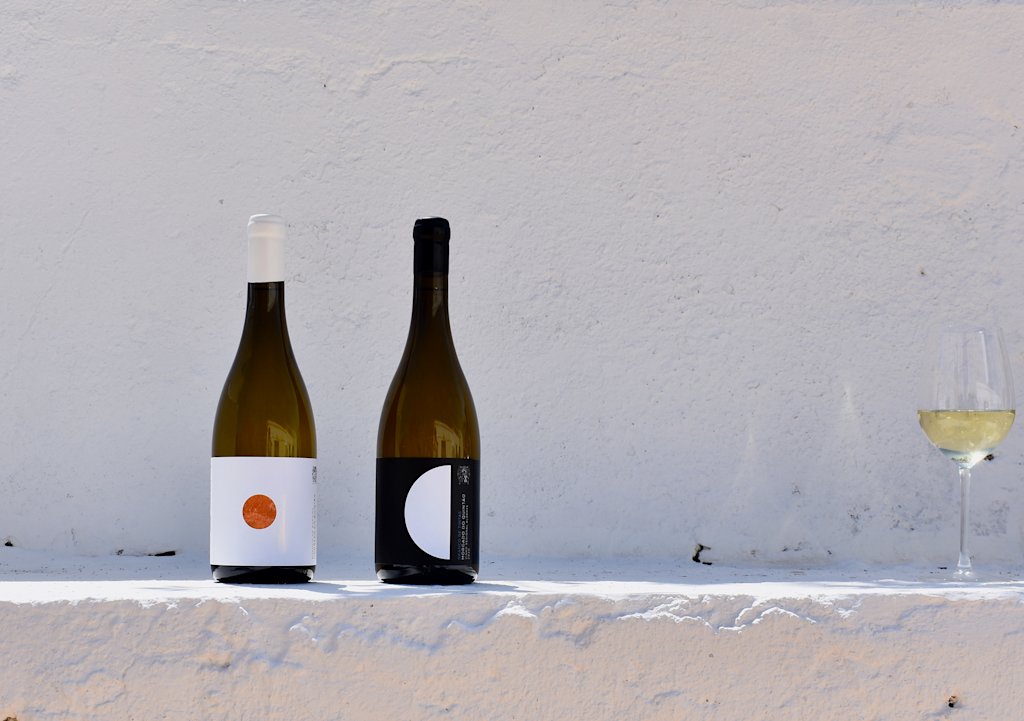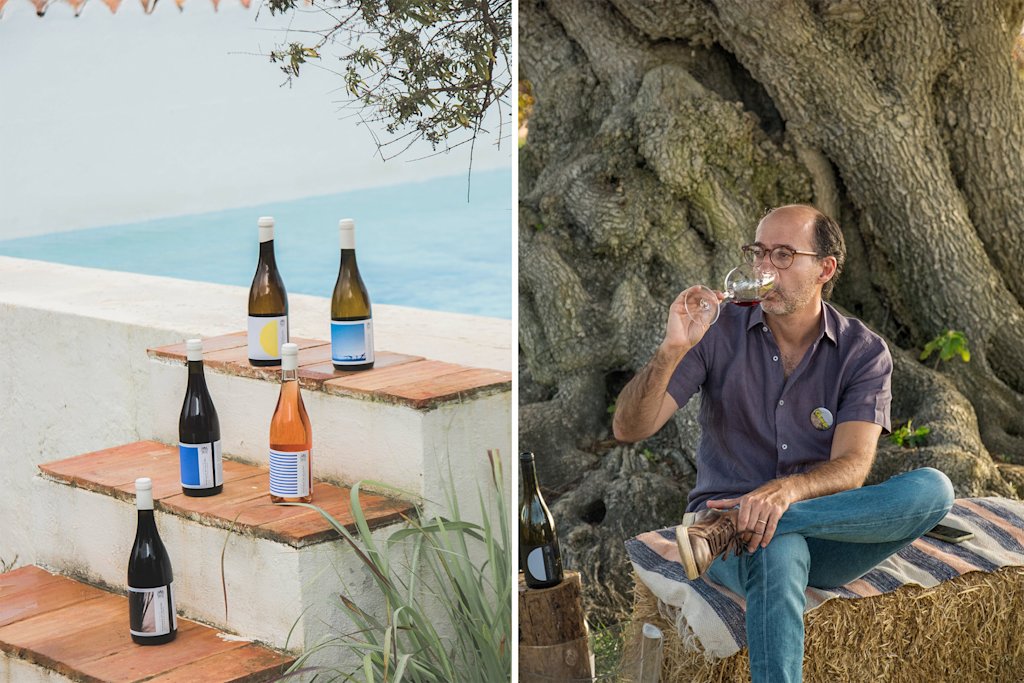
MEET MORGADO DO QUINTÃO
The story behind a restored family-owned vineyard estate bringing back winemaking to the Algarve. Fantastic Frank Lisbon sat down with Filipe Caldas de Vasconcellos, the fourth-generation owner of the centuries-old vineyard Morgado do Quintão, to talk about how over the last few years, they have successfully put Algarve wine back on the global radar. An intimate family-run estate set where the mountains meet the Atlantic Ocean, the project brings the local community together through culture, design, hospitality, food and, of course, wine.
Tell us the story behind Morgado do Quintão.
Morgado do Quintão has been in my family (on my mother’s side) for over 300 years. In 2016, a year before my mother passed away, I became a sort of caretaker, the guardian of the place. When I took over the property, I saw the potential to produce Algarve wines and to build a stronger relationship with the region from many different points of view, including hospitality. At the end of the day, I saw it as my duty to take care of the family legacy and lay the groundwork for the future.
My purpose over these last few years has been to take the Algarve wines farther and show their quality to the world. I’ve also nurtured a close relationship with the region after many years of spending my summers there, and I’ve witnessed its transformation into something that has gathered an equal number of lovers and haters.

How do you think Morgado do Quintão can contribute to the Algarve region?
We can focus on agriculture through winemaking and also hospitality. We’ve been — successfully — working on these two pillars since 2016. Morgado do Quintão was passed from generation to generation, and we’re still a small business, but that’s the good news. The family ties and the more intimate way of doing things have given us, especially me, the mission of making a difference in the region through things that mean a lot to me: culture, design, food, and the connection to the land.
The Algarve mixes beach and countryside, vineyards and agriculture. Yet many people only know one side of it. How do you deal with this perception?
Well, there are many things that people don’t know of in the Algarve. Only the more curious are willing to find out.
Those who are looking for something else, an escape.
It’s funny because when we look at a map of vines planted at the beginning of the 20th century, there were more vineyards planted in Algarve than in Alentejo. The Algarve was an incredibly abundant land and brought in many riches from different businesses, like agriculture, the canning industry, and cork.
There’s even historical proof that the Alentejo and the Algarve were incredibly wealthy many centuries ago, more than northern Portugal.
Algarve was a wealthy region, but they put all their eggs in one basket: tourism. But my gut right now is telling me I have to help in the change of perception towards the Algarve. And that’s precisely what Morgado do Quintão has been working on since 2016. When we see our wines in Michelin-starred restaurants, or we’re in New York talking about our wines, and people are loving the Negra Mole variety, for example, it bestows me with this sort of power and it allows me to contribute not only to my project but to the region as a whole. And I take it very seriously.

What about the other side of the business, such as design and architecture, for example?
Those are very important to us. Regarding labels, we work not only with Portuguese designers but with artists that stay with us in residence. It’s a crafty way of connecting with people and the land, agriculture, and of course, culture — with capital C. When we put together a music festival, and we bring in Carminho or Mário Laginha, it’s our way of imparting the region with Culture. And that’s the concept behind Morgado do Quintão, a connection between two worlds, a platform that brings all these topics together. Art is also critical to us. We support an art gallery in Lisbon, As Salgadeiras, and we’ve already had five or six artists in residence in the last few years. It gives us utter pleasure to be able to work closely with artists. And my mother was a visual artist — every year, we launch a label with one artwork from her archive.
It’s clear that Morgado do Quintão is about much more than just wine.
All of the decisions we make, the way we work on the labels, the music and culture festival we put together — we want to give something to the region. All the energy we put into this is working towards taking the Algarve to other places. There’s definitely a broader vision and perspective that includes much more than wine, for sure.
But let’s talk about the fantastic wine now.
2016 was our year of experimenting. When I took on the property, the vineyards were pretty damaged, and the grapes we produced were only being sold to the regional co-op. It didn’t make any sense. So, my initial idea was to start producing wine. We created a brand and tested it to see if there was a product market fit. We made 3,000 bottles of Clarete and Palhete varieties, which were family recipes. Our oenologist Joana Maçanita worked with us to figure out what made sense, what was missing, and what was our truth. Those two wines opened a pandora's box that has gotten bigger and bigger over the years. Today, we make 11 references with three varieties: a regional variety called Negra Mole (which I mentioned earlier and is native to the Algarve only and one of the oldest in Portugal); Crato Branco, a white variety from the Algarve; and Castelão, which is widespread in Portugal. All of this entails much thought and deliberation to build something from what’s already there.
And renovation, too.
When you have a property that’s been in your family for so long, all the decisions come with a certain amount of long-term vision. We’re thinking about the next 300 years. I’m always thinking about what the future generations want me to leave for them.
All of that takes its time. Nature takes its time. You can’t really rush nature.
I also like to think about how I’m contributing to my community and don’t want to make any drastic decisions that will irretrievably change the history of this place. Today, we’re constantly being encouraged to go in a different direction as managers and as quickly as possible. But we’re not interested in that. We’re here for the long run.
What can you tell me about those plans for the future?
There are many different points of view we’re working on right now. On the one hand, we planted new vineyards last year, Portuguese varieties only that have been part of the Algarve’s DNA since day one, such as Perrum (a variety that was considered to be lesser than other varieties), Aragonês and Arinto, for example. We’re also making headway in this year’s music festival, which will take place in October and welcome 15 speakers and three musicians for three days. The line-up is extraordinary — but I can’t reveal it just yet. This is our way of bringing people from the community and local players into our world and showing them that the Algarve can be amazing. Also, if everything goes our way, we’ll continue to work on how we welcome people to our property. We’re collaborating on an exceptional project with the architect Manuel Aires Mateus, who also has an intricate vision of the territory and the land, which is something that has everything to do with Morgado do Quintão. There are a handful of plans we’re proud of, and we will continue to keep our Algarve roots alive and kicking.
Interview by Soraia Martins.
Read More
View All








